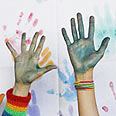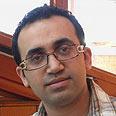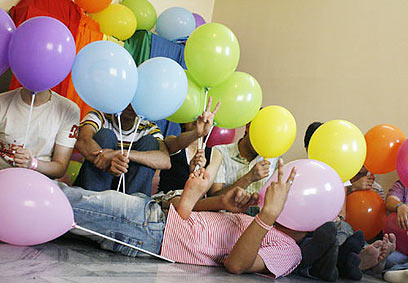

VIDEO - Last month, quietly, under the nose of the ayatollah regime, a group of Iranian homosexuals decided to celebrate the national LGBT (lesbian, gay, bisexual and transgender) day. Naturally, however, they were unable to march through the streets of Tehran waving the rainbow Pride flags as they passed the house of President Mahmoud Ahmadinejad.
"It was a small event, less than 12 people," says Faruh, an Iranian homosexual and member of an organization that assists homosexuals who have fled the Islamic Republic. "They had a ceremony at home and then went out for a drive."
One reason the event encountered no difficulties and without arrests, he says, was that the participants didn't spend much time organizing it and didn't say a word about it. "They said they waved Pride flags but it was probably not for long," he adds. "It was probably inside the car where nobody saw."
In Ahmadinejad's Iran, young people with different sexual mores are not welcome. Just last month, police burst into a party in Shiraz and arrested 17 homosexuals after they were caught with drugs and alcohol, according to the police. Rights organizations say 11 homosexuals face the death sentence just for their sexual preferences.

Meeting places in each big city
Though the authorities refuse to recognize them, homosexuals still find ways of meeting.
"In every big city there are recognized places where the community meets," an activist in the Tehran community, who asks not to be identified, tells Ynet. "There are cafes which dedicate an evening to homosexuals, and once in a while the meeting place changes."
The activist, who writes a blog on homosexuality and distributes information to people who have no internet access, is not afraid. "I grew up in fear, and I'm used to it," he says. "After a while, the fear becomes a part of life and you stop being afraid."
Iranian homosexuals also meet over the internet, of course, on sites like manjam.com which has thousands of members. "It happens on the net, and it's quite dangerous," says Arsham Parsi, head of Iranian Railroad for Queer Refugees.
Ahmadinejad explains, "There are no homosexuals in Iran"
In 2005, Parsi fled Iran to Canada where he set up the organization assisting refugees like him to obtain asylum. "Today we're working on 250 cases, and course there are many others who haven't turned to us."
Just last week three lesbians from Iran received confirmation from the UN Refugee Agency to request asylum in the US.
"As far as we know, the government observes the dating sites and collects information on people in case they get arrested," Parsi explained.
Faruh added, "Intelligence agents fix meetings with homosexuals over the net and set a trap." Faruh worked together with the organization Human Rights Watch and sent a message to every Iranian who visited the site, to warn them.
Raped – then fled to Turkey
Faruh's personal story is an example of the hardships facing homosexuals in Iran, especially activists in the community. Faruh, 27 years old, fled to Turkey after being raped by the Basij militia of the Revolutionary Guard. He is currently waiting for an interview with the UN Refugee Agency in the hope of obtaining asylum in a western state.
During the controversial presidential elections last year, Faruh worked as an advisor to the reformist candidate, Mehdi Karoubi, in Karaj. After the elections were "stolen", as he puts it, and after Neda Agha Soltan was shot in the street, he experienced something he will never forget.
"Me and a friend decided to mark the 40th day of Nada' death by posting notices in the residential area," he relates. "I was sure that all the (security) forces were in Tehran and nothing would happen to us."
The attackers, he says, were Basij members in civilian clothing. "On the 40th day anniversary, they caught me, put me in a vehicle along with two other friends, blindfolded us, and took us to a place which even today I don't know what it was."
When the attackers saw his dyed hair and his styled eyebrows, he says, they concluded he was homosexual and raped him and beat him, one holding him down while another worked him over.
"They did things I don't want to remember," he says. "Even today I still have three broken teeth."
This is not the first time that the Iranian opposition has leveled charges of rape against the security forces, including sodomy by inanimate objects in order to humiliate the prisoner.
"For a month they interrogated me, sending me home each time then summoning me again," Faruh says. When an ex-boyfriend of his partner exposed him as the editor of the "Pink" magazine, he was forced to flee to Turkey in fear of his life.
'Religion says we're all the same'
When he recalls what he went through, he describes it as if it was a nightmare.
"At that moment when they blindfold you, even though you expect terrible things to happen, you still don't believe it," he says. "I simply cried. When they beat you it's like a dream, you think you'll wake up at any moment."
He almost can't recall the rape, because he fainted almost immediately and woke up to find himself naked and lone in the room.
In an attempt to explain Ahmadinejad's 2007 claim that there are no homosexuals in Iran, Faruh says, "According to religion, there can't be homosexuals – that's what they believe. Religion says we're all the same, we're all normal, get married, have children, and only a few choose to amuse themselves with other things."
According to Iranian law, he continues, the only illegal aspect is the act itself of sexual intercourse between men, but in order to be charged, someone needs to witness the act.
Until six months ago, Faruh still lived in Iran and studied English literature in the University of Karaj where he lived with his grandmother. At the same time, he wrote and was appointed editor of the gay community magazine, "Neda." He comes from a liberal family, educated above the average. "My grandmother edited my articles on homosexuality," he says proudly.
"Being fashionable in Iran is a sin," he says. "It doesn't matter whether you're a homosexual or not, you've got no right to dress as you want. When they arrest you, they don't ask if you're a homosexual. You're charged with failing to follow the Islamic dress code."
"Things are not getting better in Iran," he says. "But more and more people are showing less fear of the Islamic regime, and it's not only in the LGBT community, it's all the activists."
- Follow Ynetnews on Facebook















